Garrett Lab
Our laboratory’s interest is in mucosal immunology and the gut microbiota. We mechanistically interrogate the role of microbes and their metabolites in shaping susceptibility and resistance to diseases, including cancer, inflammatory bowel diseases, and kidney diseases.
Harvard T.H. Chan School of Public Health
665 Huntington Avenue, Building 1, 9th Floor
Boston, Massachusetts 02115
Our Projects and Publications
Learn more about the focus of our current projects and the latest articles published by our lab.

Current Projects
We have helped uncover the association between colon cancer and Fusobacterium spp. using human tissues, large human datasets, and mouse experimental systems, and we subsequently demonstrated that fusobacterium (Fna) potentiates carcinogenesis at the earliest stages of transformation. We have focused on how Fna contributes to tumorigenesis via its interactions with immune cells and by compromising anti-tumor immunity. We have also invesstigated how Fna interacts with the chemopreventative agent aspirin, a critical CRC chemopreventative agent, affects Fn. In current work, we have been investigating Fna Fic proteins, the effects of Fn hydrogen sulfide production on colorectal carcinogenesis, and Fna cancer-associated fibroblast cell interactions. Collectively, these studies lay a mechanistically-rooted foundation for precision Fna based CRC theranostics. In recent years, our collaborative oncomicrobe work has expanded to include pks+ E. coli and current work also focuses on oncomicrobes that may improve anti-tumor immunity and reduce susceptibility to CRC.
Advances in sequencing and metabolomics technologies and their analytic pipelines are fueling approaches for understanding links among microbes in health and disease. Our lab has been involved in MWAS efforts for IBD, cord colitis syndrome, and CRC. Using computational prioritization pipelines, cell-based interrogative assays, and gnotobiotic mouse models, we have established approaches for moving beyond association and assessing the causality of microbes and microbial communities in health and disease. Our work in colitis has demonstrated that microbes and their metabolites function in a causal way in disease pathogenesis. Current work if focused on the identification of microbial metabolites that ameliorate IBD and their mechanisms of action and mode of interactions with the epithelium and immune cells.
Our lab identified short-chain fatty acids (SCFAs) as microbial metabolites that play a critical role in colonic regulatory T cell (Treg) homeostasis. We determined that Treg-intrinsic responses to SCFA are mediated via Ffar2, which encodes GPR43. We found that SCFA affects Treg proliferation, population size, and IL-10 production in a GPR43-dependent manner. Not only are SCFAs sufficient to restore colonic Treg population deficits in germ-free mice, but SCFAs also boost Treg function in a Treg-intrinsic, GPR43-dependent manner in mouse models to ameliorate colitis more effectively. Our more recent work on SCFA and GPR43 has focused on the role of GPR43 in innate lymphoid cell type 3 and dendritic cells and tumor immunity. Also related to this area of study, we demonstrated that tuft cells are taste-chemosensory cells that use taste G-protein coupled receptors to sense eukaryotic (protozoal and helminth) members of the gut microbiota and to orchestrate type 2 immunity in the intestine. Current work is focused on: how non-canonical GPR43 ligands influence anti-tumor immunity, how microbial metabolites shape colon stem cell and fibroblast cekk metabolism, and iidentification of GPCR-sensors for newly-identified bioactive microbial metabolites.
Dietary intake affects microbial metabolism and foods components have micro and macronutrients that influence microbial function. We are interested in how ingested food stuffs alter host and microbial metabolism, their mechanisms of actions (with a focus on post-translation modification of the host and microbial metaproteome) and the consequences of host and microbial metabolism for susceptibility and resistance to diseases, including cancer, chronic kidney diseases, and IBD.
